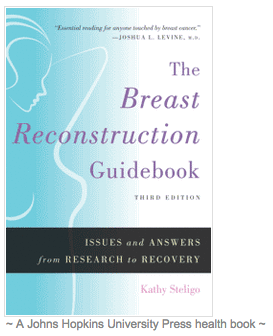Note: This is part 3 of a 3-part series related to our recent XRAY review on Roni Caryn Rabin’s New York Times piece, “‘Going Flat’ After Breast Cancer.” In part 1 of the series, FORCE volunteer, Robin Karlin discusses her decisions after mastectomy, and her feelings post-reconstruction. In part 2, Sue Friedman talks about the affect of personal ideology on decision-making.
by Kathy Steligo
If you’re facing mastectomy, you may know without question that you either do or don’t want to have your breasts rebuilt. Or maybe, like numerous other women, you’re uncertain which is right for you.
If replacing your breasts is simply not that important to you, or you want to avoid further surgery or the complications you may have heard about from other women, you may feel that going “flat” is your best personal alternative. Conversely, you may be adamant that for you, rebuilding your breasts is essential.
Asking people about breast reconstruction is like politics: everyone has an opinion. Women who are frustrated and disappointed with their results may recommend against reconstruction, while others enthusiastically recommend the same procedure based on their own satisfied experiences. The input of others can be helpful, but realize that someone else’s experience won’t necessarily be yours, and that her choice may not be the best solution for you.
Knowledge about reconstruction is growing, but too many women still go into mastectomy unaware of their options. Some physicians don’t discuss reconstruction because their knowledge about various alternatives is limited, they assume certain patients aren’t interested, or they consider reconstruction to be “unnecessary.” Others may tell you what to do, rather than helping you to understand your choices and encouraging you to make your own decision. It’s unlikely that any surgeon can tell you everything you need to know about breast reconstruction within the confines of two or three office visits; that’s why it’s up to you to learn about your alternatives, which include but aren’t limited to breast implants (which most people know about).
Making the right choice can be confusing and overwhelming, especially when friends, family or physicians try to steer you towards reconstruction or away from it. It helps to keep a few important factors in mind:
- All surgery has the potential for complications.
- Problems don’t always occur; when they do, they can usually be fixed (which may or may not require additional surgery).
- Problems are more likely with some reconstructive procedures than others.
- Not all surgeons perform all procedures.
- All reconstructive options have benefits and limitations. No single procedure is right for everyone.
- A surgeon’s skill and experience greatly affects an individual’s results.
As women, we’re all different, with decidedly different opinions about what is right or wrong for each of us. Some of us feel the breast reconstruction journey is worth the effort, and that’s just fine. Others consider it needless, and that’s also fine.
 Whether or not to reconstruct is a profoundly personal decision that should be made with sufficient accurate information. Learning about your options gives you the power of choice: the choice to say yes or no to breast reconstruction. You may discover that it can give you better breasts than you expected, or you may find that it requires more than you’re willing to go through. Either way, you’ll know that you’ve made an informed decision that is best for you.
Whether or not to reconstruct is a profoundly personal decision that should be made with sufficient accurate information. Learning about your options gives you the power of choice: the choice to say yes or no to breast reconstruction. You may discover that it can give you better breasts than you expected, or you may find that it requires more than you’re willing to go through. Either way, you’ll know that you’ve made an informed decision that is best for you.
Kathy Steligo is the author of the Breast Reconstruction Guidebook, co-author of Confronting Hereditary Breast and Ovarian Cancer, among other titles. She is editor-at-large for FORCE.
Additional FORCE Resources
Joining FORCEs Against Hereditary Cancer Conference: This 3-day conference features several sessions on mastectomy and breast reconstruction, opportunities to meet and ask questions of experts, and our popular Show & Tell event where women who have undergone mastectomy with and without reconstruction share their experiences and results with women considering surgery.
FORCE Information: Breast Reconstruction
FORCE Information: Post-mastectomy Photo Gallery
Be Empowered Webinar: Breast Reconstruction Options
FORCE also recommends The Breast Reconstruction Guidebook: Issues and Answers from Research to Recovery, 3rd Edition 3rd Edition by Kathy Steligo
